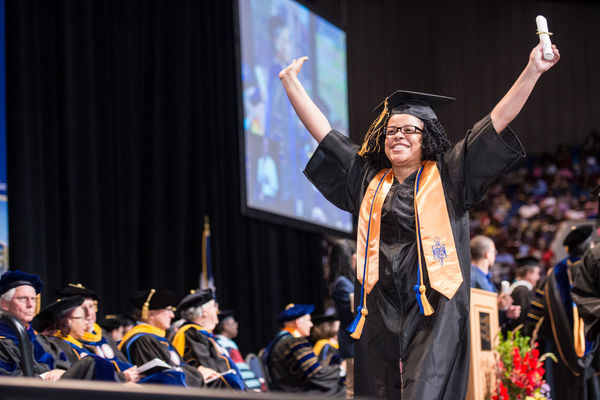Most students set off for college with advice ringing in their ears: Don’t skip class. Always do your homework. Believe in yourself.
But following this advice isn’t always easy, especially for students from non-traditional or disadvantaged backgrounds. Work schedules get prioritized over class ones. A sick toddler means the homework didn’t get done. And a lifetime of scarcity or loss can make the challenges of college seem too tough to tackle.
Graduating from college pays big when it comes to future employment and earnings. But although 70% of high school graduates enter some form of higher education, only 35% earn a degree. How can we help more students—especially those from low-income backgrounds who are more likely to be juggling work, caring for dependents, strapped finances, and other challenges—make it to graduation day?
Lots of people have been thinking about this for a long time. Earlier this month, LEO and The Institute for College Access and Success (TICAS) convened a group of service providers, researchers, and policymakers to distill what we have learned from a decade of offering interventions designed to help students persist in school, and studying the impact of those interventions.

Although each service provider at the convening operates a unique model—tailored to meet the life experiences of their student bodies—they all point to the power of relationships as key to helping students succeed.
“Our mission is grounded in unlocking human potential,” says Malika Clinkscales of Inside Track. The organization pairs each student with a coach to help them manage life as they engage in their studies. Malika has found that when a student isn’t doing well in school, it’s not just an academic problem or that the student isn’t capable. It’s usually because they have something going on at home or are facing some other personal challenge. "The relationship is the connection," Malika says to explain Inside Track’s success, even during Covid-19 when students and coaches can’t meet in person.
The college persistence interventions found to be most successful have this type of one-on-one mentoring component to them, provided by dedicated coaches who work with students over a long period of time to build trust. Coaches help students map out a plan for college and career, and help them overcome obstacles that threaten to derail that plan.
It can be tempting to seek a less time- and cost-intensive payoff that could potentially reach more students—say in the form of offering immediate financial assistance for school and life needs. But LEO’s evaluation of Catholic Charities Fort Worth’s Stay the CourseTM program concluded that students who only receive emergency financial assistance fare no better in school than those who don’t get any support at all.
Stay the Course still offers financial assistance today, but specifically and strategically and always paired with personalized case management to make sure the student makes it all the way over the obstacle. “We buy a lot of car tires,” says Judith Priest, who oversees the program. “We focus on those nonacademic obstacles that students face—life happens.”
Allison Calhoun-Brown, who oversees student success programs at Georgia State, also asserts that tuition assistance alone isn’t enough to get students through. Students often don't know what courses to take, how to combine or sequence them, or what grades are needed to advance towards their educational goals. Pairing students with a dedicated adviser who’s trained to see signs that a student is straying from their college path makes the difference. “How many people have taken the wrong class, and no one even noticed that they’d taken the wrong class until later?” Allison asks. “Watching can make a huge difference. Our academic advisors help students navigate many different life circumstances. They have the relationships and are paying attention, and can get them hooked up with the right resources.”
There’s something else these service providers have in common: a willingness to put their models to the test with a randomized controlled trial (RCT) and an unwavering commitment to using evidence to understand how their students are progressing and how to improve their programs.
Christine Bronginart of CUNY ASAP points to her organization’s commitment to using data as the reason for the high graduation rate of students in the program. “Being replicated nationally is just another demonstration of the power of our model and approach,” she says. “But all of that is underpinned by the notion of ensuring all levels of staff have the data they need to assess student performance and program engagement. Data is so baked into our way of work. Building that evidence base early and being so committed to that has been a cornerstone of our success.”
Data helps paint a fuller picture of a program’s impact after a student graduates, too. “We ultimately want our program participants to not only graduate, but to earn a living wage job,” says Judith Priest of Stay the Course. “Being part of an RCT, we have worked with LEO to track our students post-completion. We find that those students who are completing their associate’s or certification and entering the workforce are beginning to earn that living wage job.”
Now that we have the evidence that these types of comprehensive, relationship-based programs are effective at helping students persist in college, we have a clear next step: Share what we’ve learned with others who can put the evidence into action to reach students in need on a larger scale. TICAS will leverage our collective body of college persistence experience and evidence to inform state and national public policy.
Because policymakers, like students, get a lot of advice, too—good and bad, helpful and unrealistic. After a decade of work and research to crack the code on what helps students persist in school and graduate with the credentials that will set them on a path to self-sufficiency, we have much more than advice to offer them as they create legislation, build programs, and balance budgets—we have evidence.